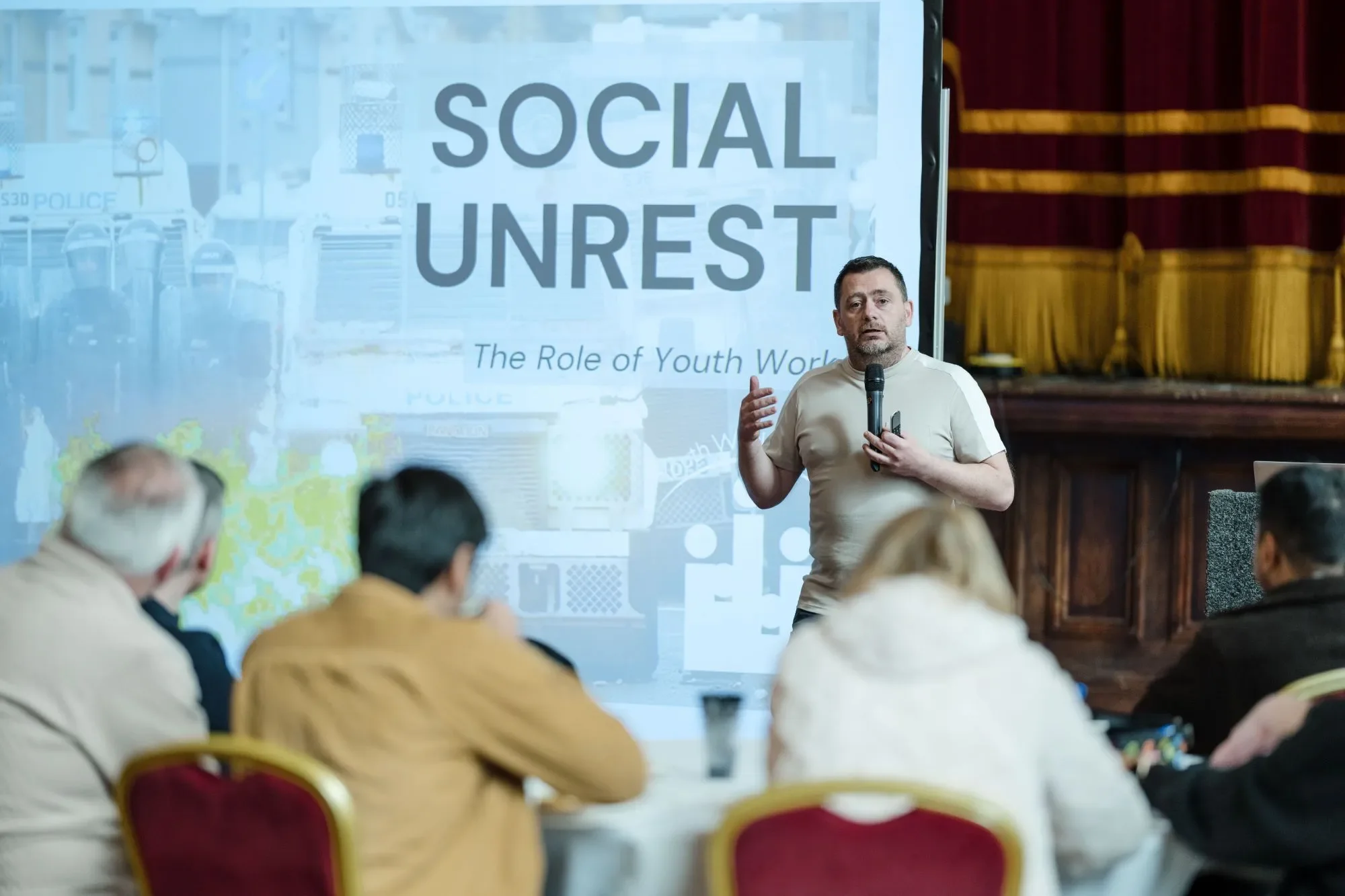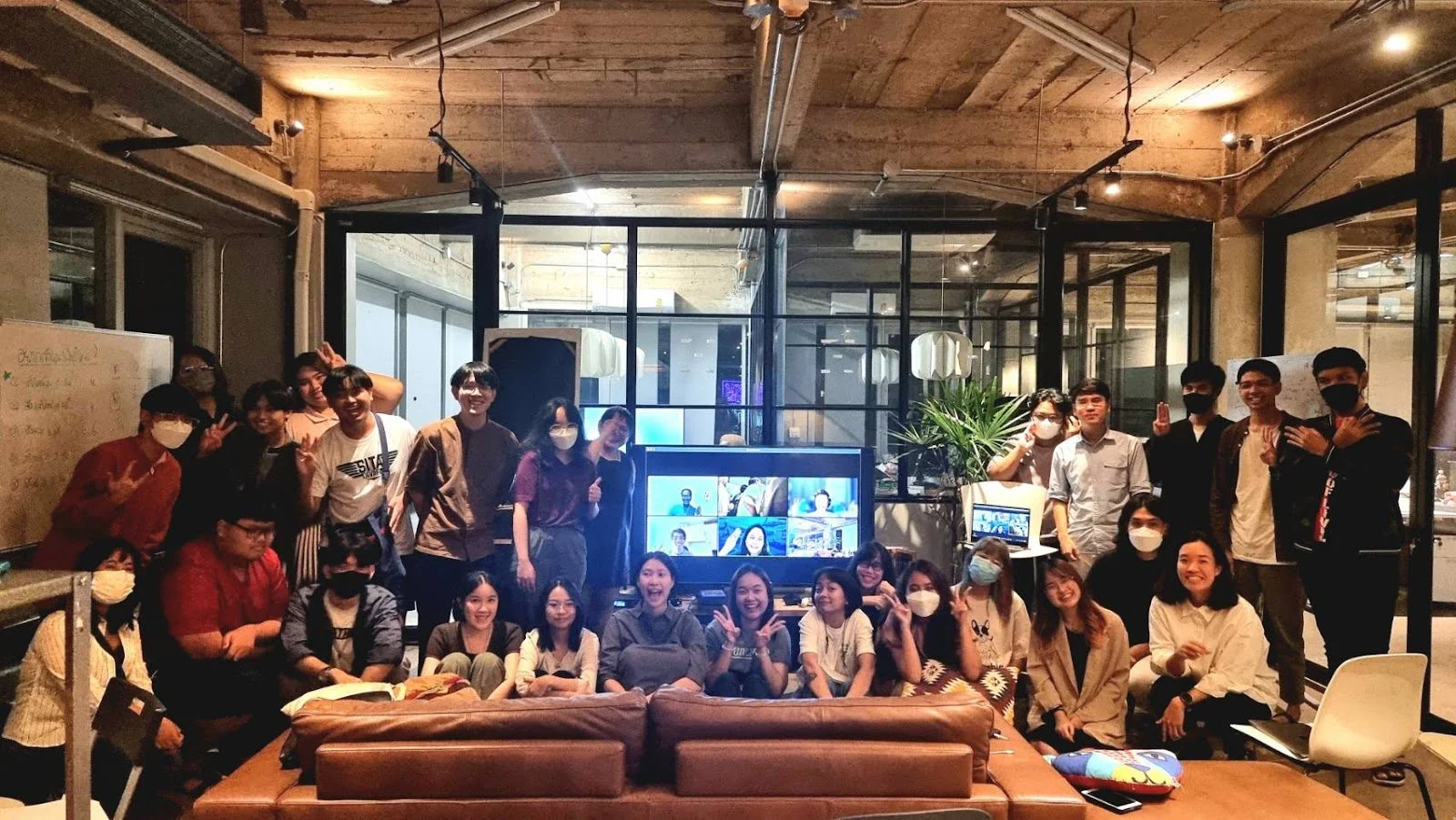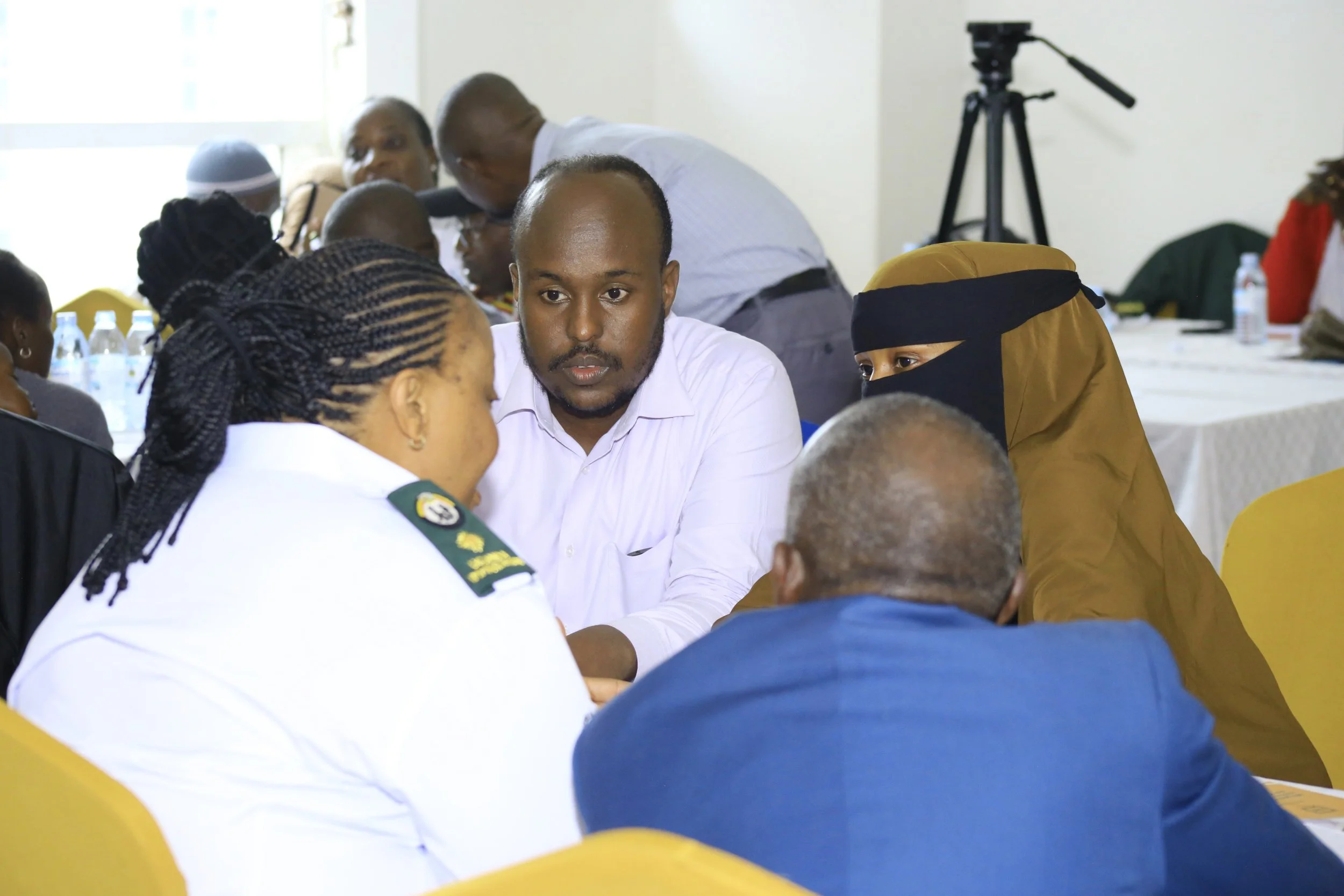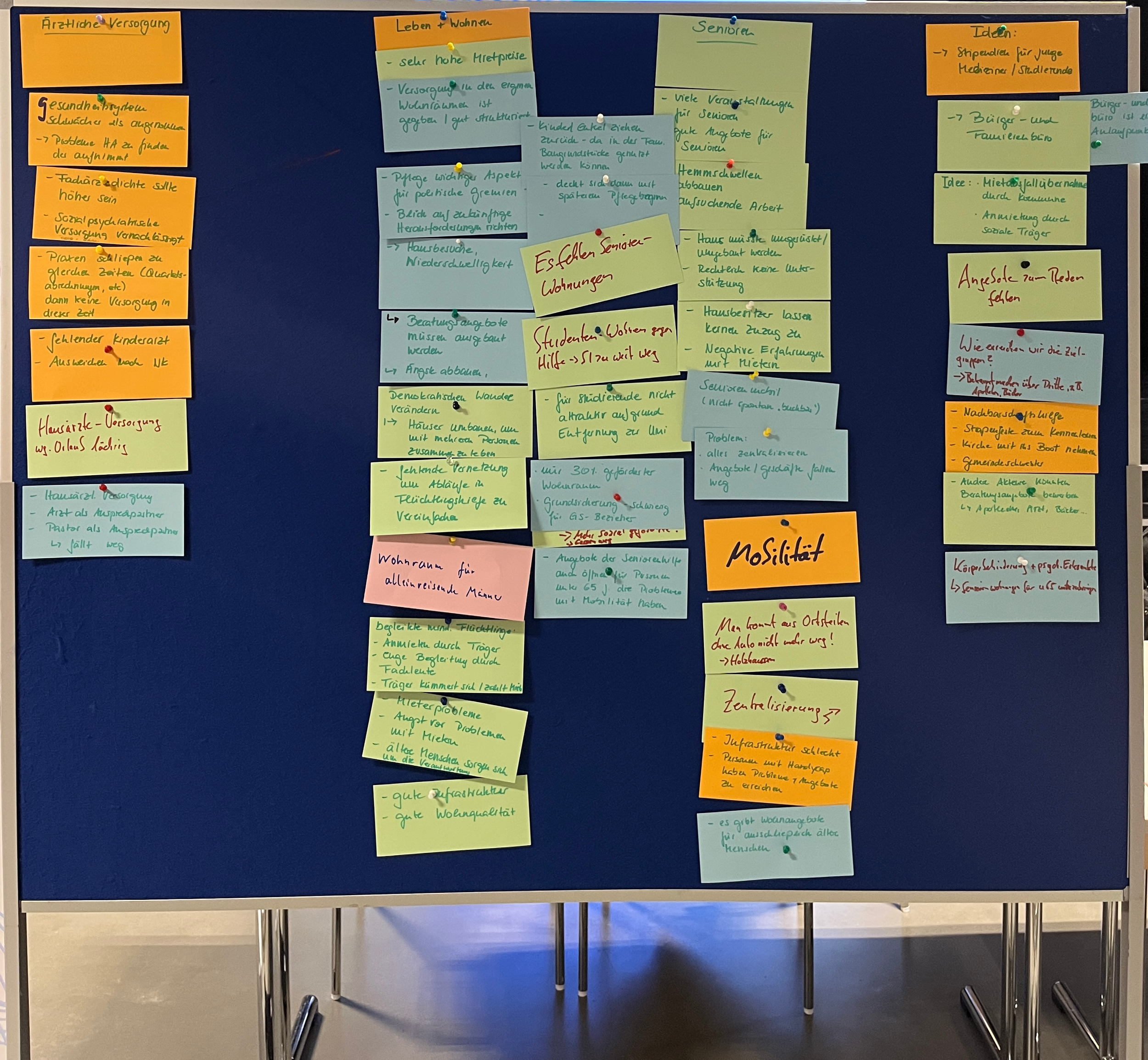Voice Matters: Digital participation in a post-conflict society in Northern Ireland
/Voice Matters during the People’s Panel in Derry/Londonderry. Source Dembrane
This is part of a series of stories on digital participation platforms produced with support from the Friedrich Naumann Foundation’s Global Innovation Hub, Taipei. To read others in the series, see these case studies from Germany and Colombia.
Twenty-seven years after Northern Ireland's peace agreement, getting residents of Derry/Londonderry to speak openly about paramilitaries and community violence remains deeply challenging. As a response, Co-operation Ireland, a peacebuilding charity, has been running Voice Matters, a program designed to empower citizens to shape the future of the city for the last five years. For over 45 years, the organization has been working to promote peace and reconciliation in response to “the Troubles and the signing of the Good Friday/Belfast Agreement.” The charity has multiple teams focusing on policy, civic society, and youth. This case study focuses on the civic society’s Voice Matters project.
“Voice Matters is a community resilience initiative that uplifts the voices of citizens affected by paramilitary violence and marginalization, showing that change is possible through citizen-led action,” explains Ireland Twiggs, Voice Matters coordinator.
One of Voice Matters’ initiatives is the People’s Panel in Derry/Londonderry, which is a three-day citizens’ assembly held over two weekends, structured around three key phases: learning, deliberation, and decision-making. Day one focuses on learning and inspiration, two keynote speakers and a speaker carousel of five or six grassroots voices give community members direct access to diverse perspectives. This day is about “giving people the belief and instilling hope, encouraging them to dream big and think outside of the box.” Day two shifts to deliberation, where small group discussions explore key themes such as trust between groups, mental health and addiction, poverty, and education, all under the broader topic of community safety. The final day focuses on decision-making, where participants refine, critique, and vote on recommendations.
“I think, after this weekend, if our voices can be heard in here, then our voices should be heard outside of here, and if we work and shout loud enough together, we can change our wee city for the better.” People’s Panel participant
While previous iterations of Voice Matters have been successful, the organizers saw the need to introduce a digital tool to aid the process. In their latest iteration, held between March and April 2025, they introduced a digital participation tool, Dembrane, which significantly improved engagement and transparency. “So we essentially brought in tech, i.e, the digital tool, because when I delivered it for the first time, two years ago, I felt like I did a disservice when it came time to write up the report, said Twiggs. 2025’s initiative was specifically designed to engage the voices of residents to ensure that decisions and recommendations reflect the needs of those most impacted by them.
In previous iterations, Voice Matters worked with small communities using traditional methods. However, organizers felt this approach missed important “community building and resilience” aspects. “I felt like we were using kind of traditional methods of flip charts and papers, and we had loads of facilitators, notetakers, and while it was still an impactful, valuable process, it felt like we weren't capturing all of the things that we could have been capturing, because this project is so special. After all, not only do we deliver policy outcomes that we bring to the council, but it's a massive community-building project. We also do cross-community work; we bring in those from the newcomer communities, and there's a lot of community building and community resilience that takes place that we were just unable to capture using the traditional methodology, because we were so focused on the recommendations,” explained Twiggs.
Selecting a digital tool
Ireland Twiggs explained that after realizing the need to integrate technology, they explored several options, and they chose Dembrane because it was “so seamless to use.” She recalled, “I remember the first day I did the call with them, they said, ‘You just need to scan a QR code, and it’s on your phone.’ That was great for us.” A key factor was that Dembrane required no additional equipment or capital spending, which was important for their grant-funded organization: “We didn’t need to buy laptops or phones or things like that.” She also valued that staff needed no extensive training: “I had this fear that we’d have to bring in loads of staff for webinars and training... but we didn’t.”
While previously hesitant to introduce technology in the deliberative panels, Ireland Twiggs opened to the idea and selected Dembrane’s ECHO, a web-app that makes engaging large groups in discussion more effective than ever before. It allows users to easily record up to thousands of conversations at the same time and analyse them with industry-leading AI models in real time. Twiggs admitted she was “almost a technophobe” and initially resistant to AI, but was won over by how user-friendly the platform was: “You can see the insights so clearly, and it’s so user-friendly.”
Expanding on her selection process, she added, “One of the main reasons we chose Dembrane was their hands-on approach, which made the whole process so much easier. As a team of one, I really valued having both the technology and a partner like Evelien from Dembrane to guide me. She supported us throughout, joined our panel, and was always available when I needed help. That level of support made a big difference. The platform itself is easy to use and adaptable, which gave both me and Co-operation Ireland the confidence to deliver the project. Dembrane fits into existing workflows and helps people engage without overwhelming them. We found the dashboard simple yet powerful, and it's designed to support, not replace, human decision-making,” Twiggs.
Finally, she highlighted the trust factor: “I appreciated Evelien’s background as a community organizer. Sometimes the tech world and the community world can feel far apart, but Dembrane was developed from that perspective, which made it trustworthy for our participants.”
“There’s a lot of fear around AI, but Dembrane helps reframe it as a supportive tool. It helps organize messy data, and once people see that transparency, it builds trust. I wish more AI companies focused on bringing people along in the process like this,” Twiggs.
Co-operation Ireland also highlighted the importance of selecting a tool that aligned with their data privacy, security, and protection needs during and after the process. They selected Dembrane because of how it handles data.
To safeguard participants' personal information, Dembrane’s ECHO ensures that personal data is not shared during the deliberations; the tool only retains the data that participants choose to share.
The platform then transcribes the recording; however, because voice recordings can potentially identify individuals even when anonymized, Dembrane uses its own transcription models and ensures that no sensitive personal data is shared with third parties.
All the data is stored on North-West European servers, and the data is retained for 30 days after the process and then deleted.
Seeing the immediate benefits of using an AI-powered tool
When Co-operation Ireland introduced ECHO to their deliberative democracy panels, Twiggs said the transformation was immediate and surprising. Rather than creating barriers, ECHO, Dembrane’s AI-powered transcription and analysis tool, became a catalyst for unprecedented openness. Co-operation Ireland facilitators noticed "a lot more vulnerability than we've heard previously" as participants began sharing experiences. The technology didn't just capture their voices, it provided the psychological safety that they were being heard, and that what they shared was actively shaping the outcomes, enabling genuine dialogue in a post-conflict society.”
ECHO shifted the entire dynamic of engagement. As participants watched their insights visualized in real-time after each round, seeing their individual contributions woven into broader community themes really helped them to stay deeply engaged throughout the three-day process. Additionally, for facilitators navigating these sensitive conversations, ECHO solved a critical challenge. Before, they faced the impossible task of moderating discussions about community resilience and violence while simultaneously trying to capture and synthesize complex inputs and instant feedback. This dual burden often means either losing nuanced insights or failing to guide participants through difficult topics fully. With ECHO handling transcription and initial insight generation, facilitators could be completely present, enabling them to tackle the harder questions and focus on the nuances, essential for meaningful peace-building work ánd concrete results. But the impact extended beyond citizen panels themselves.
However, during the panels, it was still important to ensure that facilitators critically review and validate AI summaries, rather than accepting the AI summaries with no question, so Ireland Twiggs reiterated the ‘human–AI collaboration’ to the facilitators. “Human intervention was essential, especially to ensure inclusivity: facilitators could actively balance participation so that all voices were heard.” After each day, the facilitators, supported by the Dembrane team, shared emerging findings, giving participants the chance to reflect and reflect on their inputs, while thematic group rotations and printed summaries ensured that everyone could engage with multiple perspectives and provide feedback across tables. This allowed the facilitators to see if the AI summaries missed something, misinterpreted or transcribed something incorrectly, and correct it before the day’s summaries were finalized.
Dembrane 2024: AI-created images based on participants' descriptions and shared visions.
When Co-operation Ireland presented ECHO-generated visual insights and data clusters to funders and government stakeholders, the response was immediate recognition of the project's legitimacy. In Northern Ireland's divided government structure, having concrete, comprehensive data to support community recommendations carries enormous weight. “We can actually back up the claims we make come from the community, which in the past we haven't been able to,” reflected Twiggs.
“What surprised you? The similarities. Once the people have it, it's just unbelievable. They were all thinking the same thing, you know. Especially if they've got it right with the demographics and the diversity of the people here. To have that alignment is quite astounding. That surprised me. Pleasantly surprised.”- People Panels’ Participant
Perhaps most significantly, one of the facilitators described that the support of ECHO in their process helped foster genuine hope. Participants left everyday not just feeling heard, but they could increasingly see a shared ‘future’ emerge as the days went by; through the creation of’ visuals on day one, and the concrete insights of their discussion and ideas on day two, and by day three a list of shared priorities that each person could vote on, all testaments of their collective capacity for positive change. “As co-founder of Dembrane, I like to believe that ECHO didn't simply digitize Co-operation Ireland's existing process, I believe it fundamentally reimagined what civic participation could look like in a post-conflict society, transforming both the depth of community engagement in the moment, and the legitimacy of its outcomes in the near future,” added Evelien Nieuwenburg.
How it works
The tool records conversations and has a big pause button, which allows people to choose when not to be recorded. Interaction between users and the AI tool is minimal during discussions; instead, the AI distills the conversation afterward. ECHO wove AI throughout the entire deliberative journey, creating what Ireland described as a "transparent and open" process that participants could witness unfolding in real-time:
Real-time transcription and analysis: AI transcribed all table conversations and generated summaries for each discussion group. Dembrane’s ECHO platform recognizes the AI-generated summary as a provisional draft, enabling facilitators to review the summary and show participants the output, and ask participants to correct their inputs in real-time.
Cross-table insight synthesis: AI analyzed conversations across all tables to identify common themes and generate comprehensive insights.
Statement distillation: AI processed insights from all tables to create actionable statements that participants could then vote on to assess potential community impact
Pattern recognition: AI helped identify changes in sentiment and participation throughout the multi-day process
Visual representation: AI-created images based on participants' descriptions and visions shared at tables, although this is not directly part of the tool; however, the descriptions were taken out of ECHO and combined with screenshots from Google Maps to create adjusted images in Midjourney.
Ireland Twiggs during the People’s Panel
Dembrane deliberately doesn’t do speaker diarization; it captures ideas without linking them to individuals. Co-operation Ireland found this approach supportive for open dialogue by focusing on collective ideas rather than individual voices, which “does a lot for people’s sense of safety. People feel like it’s not about them individually, but the ideas that are emerging as a group,” Twiggs.
Twiggs explained the importance of participant consent and explained how the tool works for people. “We had a consent form created to inform participants about the data collection and storage part of the process. People may have been hesitant at first, but we supplied them with our laptops, tablets, and phones. Supplying participants with Co-operation Ireland-owned devices was a strategic decision to ensure that the process was secure, accessible, inclusive, and limited technical issues. For instance, it ensured the recordings were standardized, and personal apps could not interfere with the recordings, and all participants, regardless of tech familiarity or disability, had equitable functionality and experience. Despite low levels of digital literacy and initial concerns about privacy due to the region’s history, Dembrane and its easy-to-use functions helped participants feel more involved.”
“Given the history of the troubles here and the conflict. Often, things like audio recording and similar activities can pose a risk to the community; they don't want to risk having their voices or any other information leaked back to them. But actually, I think what we experienced this year was the complete opposite of what people expected. People wanted to see how their ideas were informing the outcomes.” Ireland Twiggs. People kept on conversations and were able to make sure voices were heard/with large participation.
”Despite our reputation for division, we can all come together and safely sit in a seat.” People’s Panel’s Participant.
People Panel Outcomes
Participants and facilitators during the People’s Panel
Going digital enabled Co-operation Ireland to use a multi-layered AI approach that supported both the deliberative process itself and the post-event analysis, enabling facilitators to focus on human connection while ensuring comprehensive capture and analysis of community input in a challenging post-conflict environment. Additionally, the recent panel was the largest yet, with the most diverse cross-community participation, including a non-English-speaking Arabic participant. “For participants requiring language support, a live interpreter was present at the table and worked directly with the Arabic-speaking participant. I also collaborated closely with the interpreter in advance, providing documents and the facilitation plan so they could prepare for each activity and understand the overall flow,” explained Twiggs.
For Co-operation Ireland, the collaboration between AI and human facilitation made the process more efficient, allowing stronger facilitation and producing outputs that were more accessible to participants. The new digital approach allowed real-time recaps, surveys, and image generation, keeping morale high and boosting engagement: “We saw more participation than in previous years. These methods encouraged broader participation, not only from those for whom English was not a first language, but also from participants with lower literacy levels or different learning styles.”
Twiggs explained why introducing a digital tool in their context was beneficial. Derry/Londonderry, and Northern Ireland more broadly, is a very divided place, so in this context, technology acts as a neutral voice. “When combined with elements of deliberative democracy like sortition, random selection, and well-structured events, the technology becomes especially valuable in Derry/Londonderry’s divided context. Voice Matters ensured participation across communities and now has a neutral third voice that writes, types, and delivers outcomes. In a place like Derry/Londonderry, this neutral role is important because it reduces bias.”
There is generally low civic engagement and high mistrust in the government, which made it challenging to initially obtain the Council’s support. “But we've made really big strides, and I think using Dembrane made a huge difference with that, as it kind of ensured that the outcomes were accurate and community-driven.” Co-operation Ireland, acting as an independent third party, helped build trust and credibility. Over time, the Council has come fully on board, supporting the project and allowing Co-operation Ireland to present council deputations. The Council has been involved in presentations and discussions, and significant progress has been made to ensure that outcomes are accurate and community-driven rather than superficial. The ultimate goal is for the government to adopt and implement the resulting outputs and outcomes through policy.
The key recommendations from this work included promoting integrated education and integrated social housing to break down divisions and strengthen community safety. Deliberative democracy in a post-conflict setting not only produces policy ideas but also builds civic trust and engagement by giving people space to talk and listen to each other. The project is a good example of how meaningful participation happens when people talk directly, not just through surveys or online forms. Hard conversations help communities discover common ground, such as shared hopes for safety, education, and health, which builds trust and stronger policies.
We involved the police service for the first time to give a presentation. And historically, police are really not well-received by any side of the community. We were able to have them in the room interacting with participants safely. I think a lot of that comes from a variety of factors, but I think things like technology enabled us to have hard conversations, enabled us to know what was being recorded, and be transparent, and encourage people to be courageous in the things that they had to say.
“Well, for me, there hasn't been any particular talk or any particular issue of address. It's just sheer optimism and enthusiasm that people here have to make the city better. Okay. And I think if that can be captured... Anything's possible... You know, there's such light at the end of the tunnel.” - People’s Panel’s Participant
In Northern Ireland, community resilience, integration, and cohesion are crucial because many people still live in social and educational segregation, rarely interacting with those from different communities or ethnic backgrounds. This deliberative panel brought together 30 participants, leading to individual growth and a positive ripple effect as people shared what they learned with their families and local groups. Only a small percentage of the population attends integrated schools. But I think because of the trickle-down impact of this process, people can meet other people, have conversations. They saw how important it was for more integration.
“Some of the things that came out of the weekend, people were saying there were more awareness services that are already here, also an optimism, enthusiasm to make the city better… a bit of hope there for people, and also to consider all communities, and those who are relocating to Derry as well...” - People’s Panel’s Participant
While the use of a tech tool significantly improved the People’s Panel, Twiggs thinks that when it comes to participation, AI is a tool, not the solution. “This process showed that AI can streamline and make facilitation more efficient, but the foundation of success remains a well-structured and thoughtfully designed facilitation plan. When supported by skilled facilitators who understand both the process and the goals, AI becomes a tool that enhances inclusivity and encourages broad participation.”
Lessons learned and best practices from Voice Matters
Blend human facilitation with digital tools
AI and digital platforms can support, not replace, skilled facilitators.
AI-generated summaries should always be reviewed and validated by facilitators to ensure accuracy and inclusivity.
Multi-layered AI analysis (real-time transcription, synthesis, sentiment recognition) enhances depth but should remain anchored in human oversight
Facilitators remain essential for inclusivity, nuance, and trust-building
Tools like Dembrane streamline note-taking and analysis, freeing facilitators to focus on sensitive dialogue.
Build trust through transparency and consent
In many contexts, for instance, post-conflict settings, transparency is crucial: explain how tech works, ensure informed consent, and safeguard data privacy.
Let participants see in real-time how their contributions shape outcomes.
Use accessible technology and foster inclusion
Choose tools that are easy to use, low-cost, and require minimal training.
Provide organizational devices to reduce digital inequity and avoid technical barriers.
Use AI in ways that emphasize collective insights, not individual voices, to foster psychological safety.
Incorporate interpreters, visual tools, and real-time recaps to include participants with varied literacy, language, or learning needs.
Ready to explore further?
Visit the People Powered Digital Participation Platform Guide and ratings.
Sign up for coaching by an experienced mentor.
Subscribe to the People Powered newsletter if you have not already, to learn about upcoming workshops, courses and other learning opportunities.















